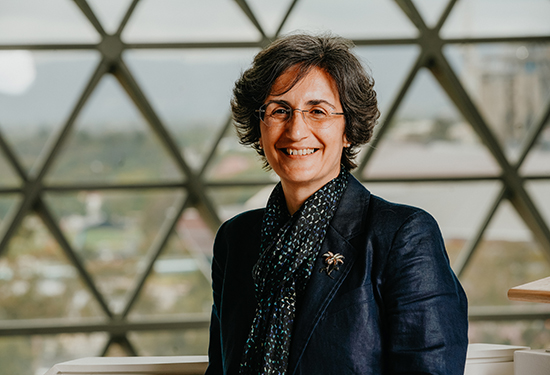
The drive to understand how Omega fatty acids affect developmental outcomes in babies propelled Professor Maria Makrides (BNutDiet(GradEntry) ’91, PhD(Med) ’95) to discover vast knowledge about maternal, pre-natal and infant nutrition that has greatly improved the health of both mothers and babies worldwide.
Recently appointed Executive Director at the South Australian Health and Medical Research Institute (SAHMRI), Professor Makrides is a global leader in translational nutrition research in the field of pregnancy and perinatal health for improved maternal-infant outcomes.
Her research program, assisted by a large, multidisciplinary team of more than 70 staff and students, assesses the role of nutritional strategies to prevent prematurity and its negative consequences for the tiniest infants, especially those born earlier than 29 weeks.
This bridges an important gap between research and clinical practice that has seen women and children directly benefit from her work, and has provided significant health, social and economic impact on the care of mothers and babies.
Professor Makrides’s clinical studies have helped change the composition of infant formulae, change international food laws, update infant feeding guidelines to introduce allergenic foods and establish specific nutrient recommendations for pregnancy and infancy worldwide. Antenatal care guidelines and clinical practice has also changed to prevent preterm birth and its consequences.
“My hope is to give children the best start in life by embedding evidence-based nutrition approaches to prevent babies being born too early and achieve better infant health outcomes,” says Professor Makrides.
Most recently, Professor Makrides has partnered with SA Pathology for the South Australian Maternal Serum Antenatal Screening (SAMSAS) program, which identifies women who are low in omega-3 and may benefit from supplementation to reduce risk of early birth.
Awarded SA Scientist of the Year in 2022 and elected a Fellow of the Australian Academy of Science and the Australian Academy of Health and Medical Science, Professor Makrides has also extended her influence to improve gender equality in medical and scientific professions.
She originally set up the South Australian Women in Science and Engineering (WiSE) Network, which has been superseded by the Athena Swan gender equity, diversity and inclusion accreditation program, with SAHMRI and all three SA universities joining. This has seen SAHMRI’s proportion of senior female researchers increase from 24% in 2015 to 42% in 2021. “I’ve done this to encourage support for the uplift of local talent, and to balance the retention of all our most promising researchers and scientists,” she says.
To help steer the next generation of medical and scientific experts, Professor Makrides continues to make a strong commitment to mentoring early- and mid-career researchers – particularly by helping women to manage work-life balance through applying flexible and innovative research mentoring strategies.
Professor Maria Makrides was awarded a 2023 Convocation Medal for her outstanding leadership in translational nutrition research in the fields of pregnancy and perinatal health aimed at improving maternal-infant outcomes.

